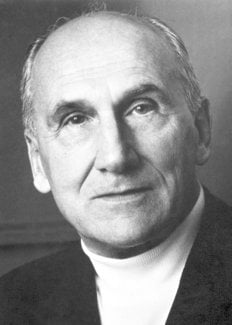Vladimir Prelog
Biographical

I was born on July 23rd, 1906 in Sarajevo in the province of Bosnia, which then belonged to the Austrian-Hungarian Monarchy and later, in 1918, became part of Yugoslavia. In the western world my birthplace has a somewhat sinister reputation that was characterized by an older tax-inspector in the Midwest of America as “the place where all that mess started”. Actually, as an 8 years old boy I stood near to the spot where Archiduke Franz Ferdinand and his wife were assassinated. At the beginning of the first World War, in 1915, we moved to Zagreb, the capital of Croatia, where I attended the gymnasium. The period 1924 to 1929 was spent studying Chemistry at the Czech Institute of Technology in Prague, Czechoslovakia. The supervisor of my thesis was Professor Emil Votocek, one of the prominent founders of chemical research in Czechoslovakia. My mentor, however, was Rudolf Lukes, then lecturer and later successor of Votocek to the chair of organic chemistry. To Lukes I owe the greatest part of my early scientific education, and he remained my close friend until his premature death in 1960. In addition to these two “real” teachers I admired Robert Robinson, Christopher Ingold and Leopold Ruzicka, all of whom I considered as my “imaginary” teachers. In later years I was fortunate to become well acquainted with all three of these great chemists.
The close of my studies with a degree of a Dr. Ing. in 1929 coincided with the great economic crisis, and I was not able to find an academic position. I was therefore very grateful for a position in the newly created laboratory of G.J. Dríza in Prague where rare chemicals were produced on small scale. I had there also a modest opportunity to do some research, but I badly wanted to work in an academic environment. This is why I was so eager to accept the position of a lecturer at the University of Zagreb in 1935. I did not know that I had to fulfil there all the duties of a full professor and to live on a salary of an underpaid assistant, but it would probably not have affected my decision if I had known. With the help of a couple of enthusiastic young co-workers and of a developing small pharmaceutical factory, I had just managed to solve at least the most urgent problems for myself and my laboratory when the second World War broke out. After the German occupation of Zagreb in 1941 it became clear that I was likely to get into serious trouble if I remained there. At this critical point I received an invitation of Richard Kuhn to give some lectures in Germany, and shortly afterwards Leopold Ruzicka, whom I had asked for help, invited me to visit him on the way. With these two invitations, it was possible for me to escape with my wife to Switzerland. Through Ruzicka I soon obtained generous support of CIBA Ltd. and started work in the Organic Chemistry Laboratory at the Federal Institute of Technology (ETH) in Zurich. The cooperation with Ruzicka lasted many years and enabled me to make my slow progress up the academic hierarchical ladder. Starting as assistant, I became “Privat Dozent”, “Titularprofessor” associate (ausserordentlicher) professor and in 1952 full professor ad personam. Finally, in 1957, I succeeded Ruzicka as head of the Laboratory, a height that I never dreamt of when I was a student in Prague. In becoming director of the Laboratory I reached, according to Peter’s principle, the level of my incompetence and I tried hard for several years to step down. Surrounded and supported by a group of very able young colleagues, I finally succeeded in introducing a rotating chairmanship from which I was exempted. So far this has worked very satisfactorily and it may have helped some of my colleagues to resist tempting offers from other Universities.
My main interests were natural compounds, from adamantane and aialoids to rifamycins and boromycin. During the work on natural compounds stereochemical problems emerged from all sides. As E.L. Eliel pointed out, stereochemistry is not so much a branch of chemistry but rather a way of looking at chemistry. It was, and still is, great fun trying to find new points of view for it.
I travel a lot. Recently I counted that I have given lectures in more than 150 places, often several times. This in spite of the fact that I do not speak any language properly. I suspect that many people come to my lectures because they enjoy my strange accent and skill in managing without actually cheating.
I married my wife Kamila in Prague in 1933. A son Jan was born to us in Zürich in 1949.
For many years, when still a Yugoslav citizen, I was already a Swiss patriot and in 1959 I obtained Swiss citizenship. However, I consider myself a world citizen and I am very grateful to my adopted country that it allows me to be one.
The way from Sarajevo to Stockholm is a long one and I am fully aware that I have been very lucky to arrive there. The journey could not have been made without the generous help of friends, colleagues, co-workers and also of innumerable earlier chemists “on whose shoulders we stand”.
This autobiography/biography was written at the time of the award and later published in the book series Les Prix Nobel/ Nobel Lectures/The Nobel Prizes. The information is sometimes updated with an addendum submitted by the Laureate.
For more updated biographical information, see:
Prelog, Vladimir, My 132 Semesters of Studies of Chemistry. Oxford University Press, Oxford, 1998.
Vladimir Prelog died on January 7, 1998.
Nobel Prizes and laureates
See them all presented here.
